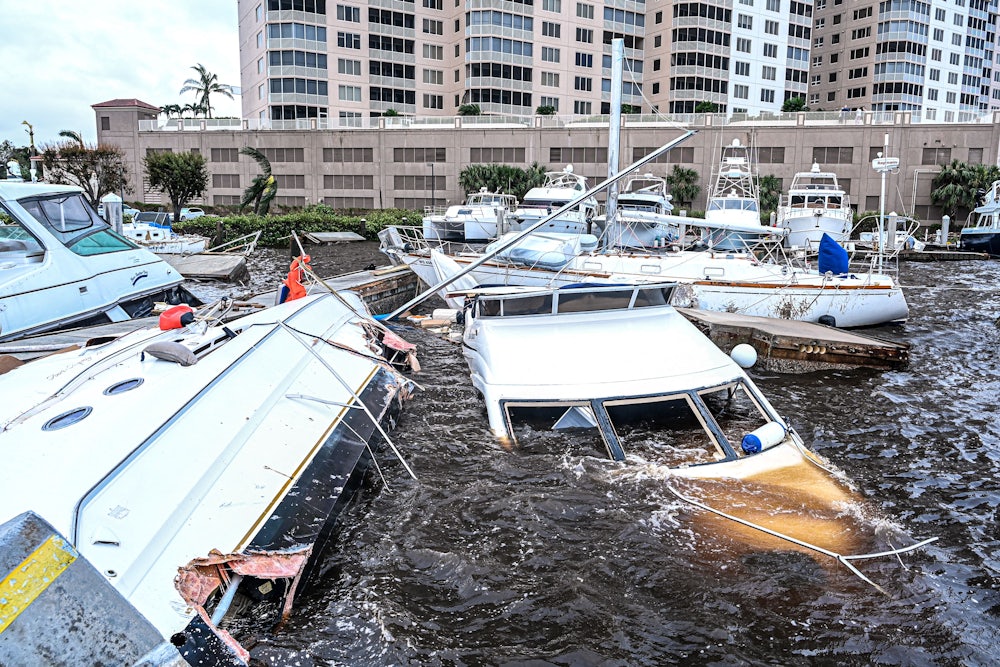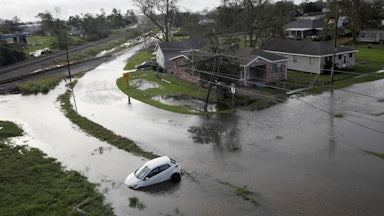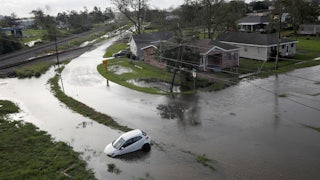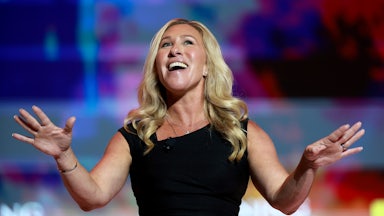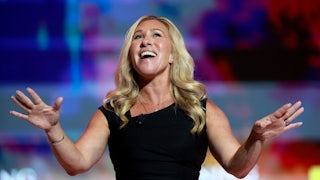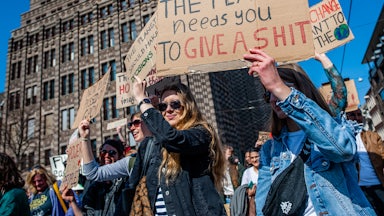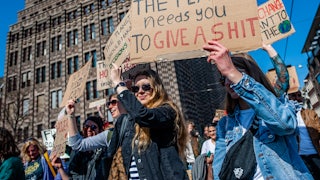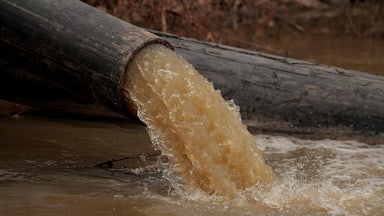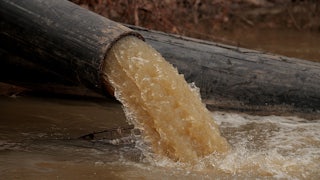When powerful Hurricane Ian smashed into Florida on Wednesday, it hit a state whose governor, unlike his predecessor, actually acknowledges that climate change is real. Once that would have been a cause for celebration. But over the past two years, Governor Ron DeSantis has illustrated just how big a difference there is between acknowledging climate change and doing anything to address its underlying causes. He’s also become less interested in climate mitigation efforts and more interested in playing politics: Florida, whose continued inhabitability hinges on averting the worst of the climate catastrophe, is suffering from the national climate culture war.
Hurricane Ian’s massive storm surge shows how the climate is changing due to sea level rise. And the storm’s sheer size, which dwarfed that of similarly intense storms of the past, is a reminder that as the climate changes, hurricanes are getting more dangerous.
Florida has a recorded history of intense hurricanes stretching back hundreds of years. But for decades now, the state’s leaders have known that climate change is making things worse. The latest predictions are that sea levels will rise over a foot along Florida’s coast by 2050. And there is now broad consensus that hurricanes will be more intense, carry greater rainfall, and cause higher storm surge.
In 2017, Hurricane Irma, a very large and powerful storm, cut a swath right through the peninsula, killing close to 100 Floridians and causing billions in damages. In 2018, Hurricane Michael ravaged sparsely populated areas of Florida’s Panhandle as a Category 5 hurricane, the highest on the Saffir-Simpson scale, which measures the intensity of tropical systems.
The unique geography of Florida creates challenges other states generally do not face, leading to concerns about the state’s future, while also galvanizing a generation of Floridian activists committed to fighting climate change. Florida’s political leadership has typically placed sustainability below short-term growth in terms of its priorities. But there’s a limit to how far that can be taken: The state has more than doubled in population since 1980 and now boasts the third-largest population in the nation with over 21 million people.
In June, Governor Ron DeSantis, as part of his broader anti-woke corporate effort, prohibited state investments in companies that use environmental, social, and governance, or ESG, ratings in investment decisions. It’s part of a nationwide right-wing move to keep investment money flowing to fossil fuels—the theoretical argument being that any shift in investment money away from fossil fuels is fundamentally discriminatory.
This was an abrupt turn for DeSantis, who came to office with the support of a key environmental group and started his term pushing environmental priorities that would boost climate resilience. He appointed the state’s first “resilience officer” in 2019 and advocated for legislation he signed in 2021 to strengthen efforts around sea level rise. This was a welcome departure from the open climate denial of his predecessor, Rick Scott. Even at that early moment, however, climate watchers pointed out that DeSantis’s approach dealt more with the effects of climate change than the actual cause of the crisis.
DeSantis has since tacked sharply rightward on migration, Covid-related restrictions, and climate to mirror the perceived preferences of national GOP primary voters. (Many in politics and the media assume he will soon be courting those voters in a presidential bid.) He recently said he sees the climate discussion as ideologically driven by “left-wing stuff” and has deemphasized warming as an element of climate change. In so doing, he’s edging closer to the rhetoric of Scott, who bears an outsize share of responsibility for how underprepared Florida is for climate disaster today.
Scott, who is now in the U.S. Senate, was so opposed to the idea of climate action while serving as governor of Florida that he actually barred the use of the term climate change by the state. This included prohibitions in every state executive agency, including those that dealt with issues related to the environment, climate, and science.
Scott was governor for eight critical years, from 2011 to 2019, winning two close elections in which he received under 50 percent of the overall popular vote. Scott’s positions on environmental matters were a campaign issue in 2014 as climate change became more visibly evident in the state, but he was narrowly reelected.
Scott’s chief ideological goal was to make Florida more friendly for business, particularly start-ups. So during his tenure it became easier to get permits for development. Scott once boasted, “Recently Florida has successfully reduced its environmental permitting time down to just two days, and that’s great!”
Funding for critical environmental and climate-mitigation projects was severely lacking during Scott’s tenure. Florida Forever, a conservation program set up by Governor Jeb Bush in 2001, was designed to function on about $100 million in state funding a year. That level was reached under Bush and his successor, Charlie Crist. But Scott slashed it to under $28 million annually in his first term.
This shortfall in funding during the Scott years, to be sure, also reflected a drift in the legislature; over the course of the last two decades, moderate Republicans have been replaced by more conservative ones, reflecting a similar shift in the national GOP since the 1990s.
Republicans in Florida have been particularly focused on culture war–related rhetoric over the last few years, and the state’s political leadership has increasingly viewed discussions about the climate in this context. As the GOP ramps up culture-war rhetoric and attacks on liberals, environmental and climate-related issues come to the forefront as the perfect red meat for the Republican base voter.
Meanwhile, local governments such as Miami Beach’s have taken matters into their own hands, aggressively pushing sustainability efforts, including raising streets, building water-pumping infrastructure, and erecting new seawalls, while Broward County in 2020 launched broader efforts at mitigation and sustainability awareness, which include an aggressive effort to convert government facilities to solar power, as well as improving water infrastructure with an emphasis on carbon neutrality. The county is also planning future erection of seawalls.
But an increasingly poisonous political culture in the state has broadened the ideological gap between large urban areas, generally governed by Democrats, and the state government, which has been controlled by the GOP since 1998.
The frequency and scale of hurricanes that impact the Sunshine State is not going to abate anytime in the future. With rising sea levels, a warming planet, and numerous water quality issues plaguing the state, DeSantis’s lack of seriousness about the forces driving hurricane intensification is becoming ever more conspicuous.
Much like with the Covid pandemic, DeSantis’s initial enthusiasm for action has eventually clashed with his desire to score political points with potential 2024 GOP presidential primary voters. His attitude leaves Floridians once again vulnerable to disaster, just as the governor’s vaccine hesitancy and aversion to masking led to thousands of excess deaths in the state.
Ian’s extreme impact is a timely reminder that Florida needs to be serious about broader climate action, including water management, carbon neutrality, and a greater commitment to solar power. But unfortunately, Governor DeSantis has once again chosen a road that puts national political considerations over the long-term welfare of his current constituency.
